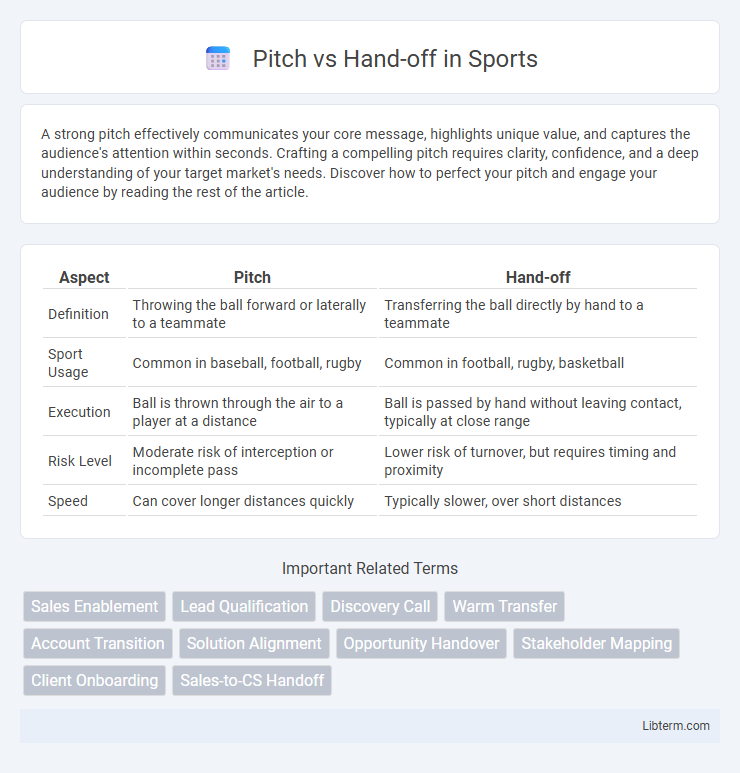A strong pitch effectively communicates your core message, highlights unique value, and captures the audience's attention within seconds. Crafting a compelling pitch requires clarity, confidence, and a deep understanding of your target market's needs. Discover how to perfect your pitch and engage your audience by reading the rest of the article.
Table of Comparison
| Aspect | Pitch | Hand-off |
|---|---|---|
| Definition | Throwing the ball forward or laterally to a teammate | Transferring the ball directly by hand to a teammate |
| Sport Usage | Common in baseball, football, rugby | Common in football, rugby, basketball |
| Execution | Ball is thrown through the air to a player at a distance | Ball is passed by hand without leaving contact, typically at close range |
| Risk Level | Moderate risk of interception or incomplete pass | Lower risk of turnover, but requires timing and proximity |
| Speed | Can cover longer distances quickly | Typically slower, over short distances |
Understanding the Concepts: Pitch vs Hand-off
Pitch involves presenting an idea or project to persuade stakeholders or clients, emphasizing clarity, value, and engagement to gain approval or support. Hand-off refers to the formal transition process where completed tasks, documentation, or responsibilities are transferred between teams or phases to ensure continuity and alignment. Understanding the distinct purposes of pitch and hand-off enhances project workflow by separating persuasive communication from operational transition.
Key Differences Between Pitch and Hand-off
Pitch primarily serves as a persuasive presentation aiming to secure approval or funding, emphasizing value proposition and emotional appeal. Hand-off involves transferring detailed project information and responsibilities to a team for execution, focusing on clarity and completeness of deliverables. Key differences include purpose--pitch targets buy-in, hand-off targets implementation--and content depth, with pitches being high-level and hand-offs containing granular task details.
Importance of an Effective Pitch
An effective pitch clearly communicates the value proposition, capturing the audience's attention and generating interest in the project or product. It sets the stage for a smooth hand-off by aligning stakeholders and ensuring all key information is conveyed succinctly. A compelling pitch increases the likelihood of securing support, resources, and buy-in essential for successful execution.
The Role of Hand-off in Project Success
Hand-off plays a critical role in project success by ensuring seamless transition of responsibilities and clear communication between teams. Effective hand-offs reduce errors, streamline workflows, and maintain project momentum by providing comprehensive documentation and stakeholder alignment. This process is essential to bridge the gap between initial project pitching and execution phases, ultimately enhancing project delivery and outcomes.
Common Challenges in Pitching Ideas
Common challenges in pitching ideas include clearly articulating the value proposition and addressing potential objections from stakeholders. Misalignment between the pitch content and the audience's interests often leads to disengagement and lack of buy-in. Ensuring a concise, compelling narrative while anticipating questions enhances effectiveness in transitioning from pitch to hand-off phases.
Best Practices for Seamless Hand-offs
Effective pitch to hand-off transitions rely on clear communication and detailed documentation to ensure project continuity. Establishing standardized templates for sharing key information minimizes misunderstandings and accelerates onboarding for the receiving team. Regular feedback loops and collaborative tools optimize alignment between pitching and execution phases, enhancing overall operational efficiency.
When to Prioritize Pitch Over Hand-off
Prioritize a pitch over a hand-off when aiming to secure buy-in from stakeholders or when the idea requires persuasive communication to highlight value and benefits clearly. Use a pitch in early project stages or product launches where establishing vision, aligning goals, and generating enthusiasm is critical. Choosing a pitch ensures the message is compelling enough to motivate decision-making before details transition into execution.
Impact on Team Collaboration
Pitching ideas effectively fosters open dialogue and strengthens team collaboration by encouraging diverse input and shared understanding. Clear hand-offs ensure smooth transitions between team members, reducing misunderstandings and maintaining project momentum. Both processes enhance workflow efficiency by aligning expectations and promoting accountability within the team.
Measuring Success: Pitch vs Hand-off
Measuring success in pitch versus hand-off involves distinct metrics tailored to each stage; pitch success is often gauged by engagement rates, lead conversion potential, and clarity of message delivery. In contrast, hand-off effectiveness is measured through seamless communication, timely transfer of information, and the alignment of client expectations with project execution. Leveraging analytics tools to track these specific KPIs ensures a comprehensive evaluation of both pitching performance and hand-off efficiency.
Future Trends in Pitch and Hand-off Strategies
Future trends in pitch and hand-off strategies emphasize the integration of advanced analytics and AI-driven insights to personalize pitches and streamline hand-offs, enhancing client engagement and retention. Virtual and hybrid meeting technologies are reshaping communication dynamics, enabling real-time collaboration and seamless transitions between sales and service teams. Emphasis on data interoperability and automated workflows is driving efficiency, reducing response times, and improving overall customer experience in complex sales cycles.
Pitch Infographic

 libterm.com
libterm.com